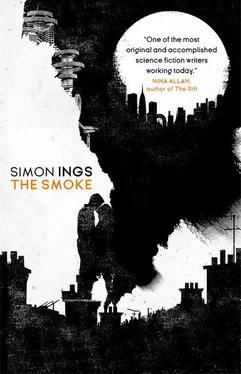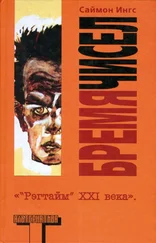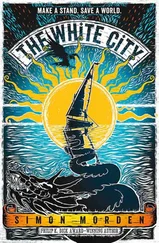This playful demonstration of Chernoy’s mastery of biophotonics elicited some scattered laughter but no one knew whether to eat the soup or not. The effect wore off soon enough, the cubes losing their motility as they cooked in the hot broth. The stuff, once I got up the nerve to try it, was far too salty.
‘If we can find match-funding from Germany then DARE goes into production early next year.’
‘So this is real.’
Stella pursed her lips at me. ‘Of course it’s real.’
‘I’m sorry, as a pitch it just sounded a bit… unformed.’
‘We’re talking about the Bund, Stuart. Things happen quickly there.’
Stella had always maintained that once she reached the age of fifty-five she would retire, fit out some attic rooms and gather together a small salon (‘It’s how all the real business in this town is done’). But, as I learned later when I caught up with the gossip columns, Georgy Chernoy’s antics outside Wyndham’s Theatre – nightly deliveries of flowers and chocolates; light but swingeingly expensive suppers; incomprehensibly pretentious cocktails in the bars of so-exclusive-as-to-be-invisible hotels; taxis to friends’ country houses – all this had turned her from her purpose. She was still acting, too – in television.
She had found a man at last. Not a boy, uncertain of sex and in need of a guide and a mother, God knows there’d been plenty of them in the last few years, but a man of accomplishment, ready to fuck her, riotously (she wanted the yellow press to know that, for some reason) and well. I wondered what Chernoy thought of that.
It amused her to cast herself as Chernoy’s plaything. She had always enjoyed pulling the puritan tiger by the tail, but ‘Georgy’s fuck’ – was there not an element of the abject here? ‘A fuck and nothing more’?
The waiting staff entered once again through hidden doors to gather up empty plates. The rest of the meal was conventional, even stolid. The Bundists were served slabs of pinkish stuff on a bed of spiralised radish. The rest of us got slices of overdone venison on under-seasoned mash and crunchy vegetables.
Once the tables were cleared, Georgy Chernoy stood up to speak at a lectern in the corner of the room. The Bund’s rather childish sense of humour and habitual bids for attention (the soup was a classic example) had this effect: that its spokespersons were earnest to a fault, dry as bones and solemn as owls.
‘We take this truth to be self-evident,’ Chernoy began, ‘that death is a mistake.’
It was ground he had covered many times, in the press and on the radio, and it was not a subject with which I felt comfortable. To take my mind off his words, I looked about the room. The girl with the jewelled ear wove past our table on her way to the toilets. This was my first chance to see her properly and her spareness surprised me. Her slim black skirt shifted tight over her thighs as she moved. High heels explained her mesmerising walk but meant that she was even shorter than I had imagined. She had a hungry look: a female Cassius, Stella would have said. Hungry and determined. I thought of foxes. I thought of crows. I watched her leave the room: her hair was shaved short at the back, a chaotic dyed-black shag everywhere else; it must have cost a fortune. Shiny things sparkled under her hair as she pulled open the door. I assumed her to be one of the angrier ‘creatives’ brought to decorate a gathering whose average age must have topped sixty.
When she was gone, I studied the room, out of sorts without really understanding why.
It was easy to tell the Bundists from the rest of us. They tended to be either very short or very tall. They did not share any particular facial characteristic. They put the lie to the notion that beauty lies in conformity. The strangest-looking of them, be they elves or ogres, displayed a health, happiness and animation that contrasted painfully with our sallow, sagging, relatively immobile faces. I wondered what they did, that they thought it worth being here, and how involved they were in government. I wondered how many backroom conversations our civil servants might conduct with them this evening, over sherry, perhaps, or spirits, or at any rate over wine markedly better than any served during our meal, in private rooms away from the dining hall. But these were idle thoughts and for all I knew the entire evening might be adding up to no more than a series of empty, well-meant platitudes.
‘To Alexander Gavrilovitch Gurwitsch, then,’ Chernoy declaimed, raising a big glass of purplish stuff. (I expect it was Vimto, though neither I nor anyone I had ever asked knew what accident of history had caused the Bund to fall so madly in love with that stuff.) ‘Brother of a concert pianist, he mastered Beethoven; pupil of Kupffer and Boehm, he conceptualised the developing shark brain; and with Vladimir Vernadsky, in that little hut in Kazan, why, it is not too big a claim to make that he dreamt up the Bomb! This modern Aristotle, for whom “the whole” was never a static entity, but rather an invariant dynamic law pertaining to the entire process of development! And as Gurwitsch moved step-by-step in that direction, trying never to lose contact with real biological data, may we uncouple his Kraftfeld from the body itself, never losing our wonder or our rigour, so we might realise the potential plasticity of all living matter, and weave for ourselves new natures, for the men and women who are to come in his name, on this and other worlds!’
By which time most of his listeners, exhausted, had set down their glasses and had to snatch them up again for the toast. We drank, not too sure of what we were drinking to, and some of us numbly suspecting that whatever it was, it was but another small, friendly, well-meant step towards our own dissolution. The Bundists around us, strictly teetotal, drained their Vimtos and grinned their bright-white grins. A second dignitary – tired, stoop-shouldered, obviously not a Bundist – stood to speak.
I took advantage of the lull to slip out of the room.
The nearest bathroom was a public toilet. Its steel trough and elbow-operated taps were incongruous fittings among the elderly brickwork and pitch-black wood.
I dried my hands on a paper towel, left the bathroom, and then, when I came to the gift shop, I continued walking until the corridor turned and deposited me outside on a gravel path. I crossed over to a stone balustrade and studied the garden below – or as much of it as could be seen in light shining from the windows of the castle.
The garden was arranged to a formal plan: a sheet of paper folded, cut about with nail scissors and spread out flat again. The planting was sparse and precise. I smelled roses.
I heard her footsteps on the gravel path before I saw her, approaching from out of the darkness. Her shoes were dangling from one hand and she was walking slowly, barefoot, over the stones. The weakness of the light, and the slowness of her walk, suggested some marine space, and it startled me when she looked up, right at me, and stopped: a first contact between separate worlds. I raised my hand in uncertain greeting. She turned to the left, along a narrow path between low bushes of lavender. As she brushed by them, their scent rose into the air. Just at the edge of vision, where the darkness prepared to swallow her again, she glanced back at me.
Small dog-like stone lions guarded a flight of steps that ran flush to the wall. I followed them down into the garden. Once out of the glare of the castle, my eyes adjusted quickly. The night was not so very dark after all. There was a full moon. The air along the lavender-lined path was heavy and astringent. It was a smell that, much later, I would recall every time I used Fel’s soap: lavender and thyme, with something metallic in the mix.
Читать дальше












